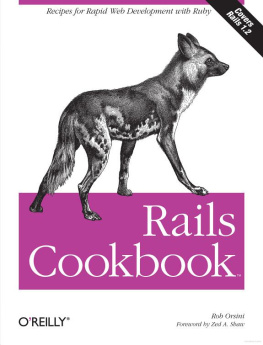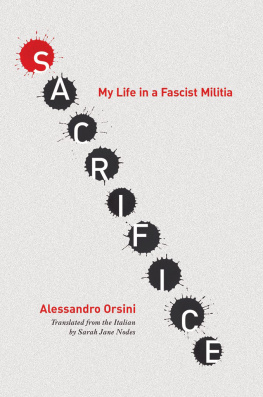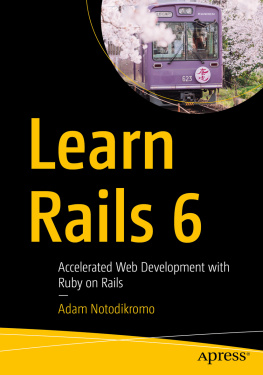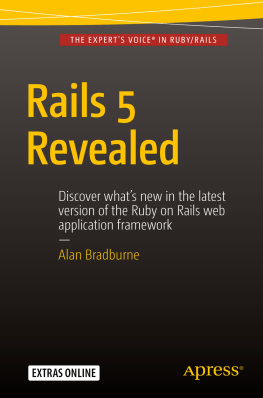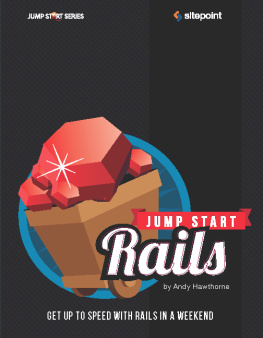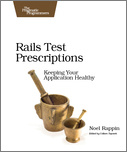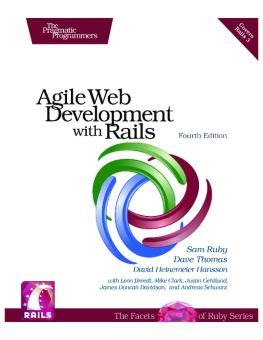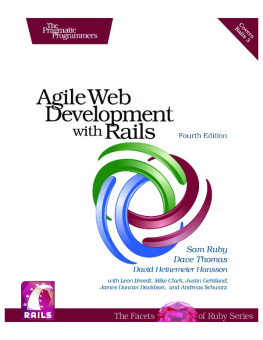Rob Orsini - Rails Cookbook
Here you can read online Rob Orsini - Rails Cookbook full text of the book (entire story) in english for free. Download pdf and epub, get meaning, cover and reviews about this ebook. year: 2007, publisher: OReilly Media, genre: Computer. Description of the work, (preface) as well as reviews are available. Best literature library LitArk.com created for fans of good reading and offers a wide selection of genres:
Romance novel
Science fiction
Adventure
Detective
Science
History
Home and family
Prose
Art
Politics
Computer
Non-fiction
Religion
Business
Children
Humor
Choose a favorite category and find really read worthwhile books. Enjoy immersion in the world of imagination, feel the emotions of the characters or learn something new for yourself, make an fascinating discovery.
- Book:Rails Cookbook
- Author:
- Publisher:OReilly Media
- Genre:
- Year:2007
- Rating:3 / 5
- Favourites:Add to favourites
- Your mark:
- 60
- 1
- 2
- 3
- 4
- 5
Rails Cookbook: summary, description and annotation
We offer to read an annotation, description, summary or preface (depends on what the author of the book "Rails Cookbook" wrote himself). If you haven't found the necessary information about the book — write in the comments, we will try to find it.
Rails Cookbook — read online for free the complete book (whole text) full work
Below is the text of the book, divided by pages. System saving the place of the last page read, allows you to conveniently read the book "Rails Cookbook" online for free, without having to search again every time where you left off. Put a bookmark, and you can go to the page where you finished reading at any time.
Font size:
Interval:
Bookmark:
This appendix lists features and changes between Rails 1.1.6 and Rails 1.2. Old (1.1.6) code will run under Rails 1.2, but you'll get warnings for deprecated features. Support for deprecated features will be removed in the next major release of Rails (2.0). The quickest way to find out what needs updating is to run your Rails 1.1.6 application under Rails 1.2, and check your logs for deprecation warnings.
| Rails 1.1.6 | Rails 1.2 |
|---|---|
| @cookies | cookies |
| @env | env |
| @flash | flash |
| @headers | headers |
| @params | params |
| @request | request |
| @response | response |
| @session | session |
| Rails 1.1.6 | Rails 1.2 |
|---|---|
| expire_matched_fragments | expire_fragment |
| keep_flash | flash.keep |
| parse_query_parameters | parse_form_encoded_parameters |
| parse_request_parameters | parse_form_encoded_parameters |
| redirect_to_path | redirect_to( path ) |
| redirect_to_url | redirect_to( url ) |
| render('#{options}') | render :file => #{options} |
| url_for(:#{options}) | Call url_for with a named route directly |
| Rails 1.1.6 | Rails 1.2 |
|---|---|
| assert_assigned_equal | assert_equal(expected, @response.template.assigns[key.to_s]) |
| assert_cookie_equal | assert(@response.cookies.key?(key)) |
| assert_flash_empty | assert(!@response.has_flash_with_contents?) |
| assert_flash_equal | assert_equal(expected, @response.flash[key]) |
| assert_flash_exists | assert(@response.has_flash?) |
| assert_flash_has | assert(@response.has_flash_object?(key)) |
| assert_flash_has_no | assert(!@response.has_flash_object?(key)) |
| assert_flash_not_empty | assert(@response.has_flash_with_contents?) |
| assert_flash_not_exists | assert(!@response.has_flash?) |
| assert_invalid_column_on_record | assert(record.errors.invalid?(column)) |
| assert_invalid_record | assert(!assigns(key).valid?) |
| assert_no_cookie | assert(!@response.cookies.key?(key)) |
| assert_redirect | assert_response(:redirect) |
| assert_redirect_url | assert_equal(url, @response.redirect_url) |
| assert_redirect_url_match | assert(@response.redirect_url_match?(pattern)) |
| assert_rendered_file | assert_template |
| assert_session_equal | assert_equal(expected, @response[key]) |
| assert_session_has | assert(@response.has_session_object?(key)) |
| assert_session_has_no | assert(!@response.has_session_object?(key)) |
| assert_success | assert_response(:success) |
| assert_template_equal | assert_equal(expected, @response.template.assigns[key.to_s]) |
| assert_template_has | assert(@response.has_template_object?(key)) |
| assert_template_has_no | assert(!@response.has_template_object?(key)) |
| assert_template_xpath_match | assert_tag |
| assert_valid_record | assert(assigns(key).valid?) |
| assert_valid_column_on_record | assert(!record.errors.invalid?(column)) |
| Rails 1.2 |
|---|
| Components are deprecated. |
| All dependency loaders formerly in Dependencies module now belong to Active Support instead of Active Controller. These include: :depend_on , :dependencies_on , :model , :observer , :service . |
| Rails 1.1.6 | Rails 1.2 |
|---|---|
| :dependent => true | :dependent => :destroy |
| :exclusively_dependent | :dependent => :delete_all |
| push_with_attributes | If associations require attributes, use has_many :through |
| concat_with_attributes | If associations require attributes, use has_many :through |
| Rails 1.1.6 | Rails 1.2 |
|---|---|
| count by conditions or joins | count( column_name, options ) |
| find_all | find(:all, ...) |
| find_first | find(:first, ...) |
| human_attribute_name | .humanize |
| User.transaction(@user1, @user2) { ... } | Object level transaction support has been deprecated. Install object_transactions plug-in. |
| Rails 1.1.6 | Rails 1.2 |
|---|---|
| content_for(' name_of_content_block ') | yield :name_of_content_block |
| :human_size | :number_to_human_size |
| link_image_to | Use image_tag within a link_to method |
| :post as a link modifier | Use :method => "post" instead |
| render_partial | Use render :partial |
| render_partial_collection | render :partial, :collection |
| 'list' %> ... | Use new block form: 'list' do %> ... |
| 'list', :url=>{:action=>'add'} %> ... | Use new block form: 'list', :url=>{:action=>'add'} do %> ... |
Bugs are a fact of life for all software projects. A bug is a defect in a software system where the outcome of running the software is not what was expected, or perhaps, not what your client expects. Bugs can be as blatant as mistyped syntax, or they can be very elusive and seemingly impossible to track down. Bugs frequently show up when software is supplied with unexpected input, or when the software is run in an environment not initially anticipated by its developers.
Debugging is the act of hunting down and fixing bugs. Experienced developers acknowledge that bugs happen, and learn a set of skills to make fixing them easier. Tracking down a bug can be rewarding and fun: it can require rethinking the logic of a program, or coming up with creative ways to expose the bug. But when a bug you were sure you had fixed pops up again, the fun turns into frustration. And some things that users report as bugs dance precariously close to being feature requests. Agreeing with your clients about the difference between a bug and a feature request could be considered part of the task of debugging.
Font size:
Interval:
Bookmark:
Similar books «Rails Cookbook»
Look at similar books to Rails Cookbook. We have selected literature similar in name and meaning in the hope of providing readers with more options to find new, interesting, not yet read works.
Discussion, reviews of the book Rails Cookbook and just readers' own opinions. Leave your comments, write what you think about the work, its meaning or the main characters. Specify what exactly you liked and what you didn't like, and why you think so.

